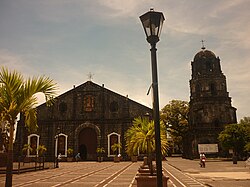Tabaco City
| Tabaco | ||
|---|---|---|
| Component City | ||
| City of Tabaco | ||
 |
||
|
||
| Nickname(s): | ||
| Location within the Philippines | ||
| Coordinates: 13°21′N 123°44′E / 13.35°N 123.73°ECoordinates: 13°21′N 123°44′E / 13.35°N 123.73°E | ||
| Country | Philippines | |
| Region | Bicol (Region V) | |
| Province | Albay | |
| District | 1st district | |
| Incorporated (town) | circa 1731 | |
| Incorporated (city) | March 24, 2001 | |
| Barangays | 47 | |
| Government | ||
| • Mayor | Krisel Lagman-Luistro | |
| • Vice Mayor | Nestor San Pablo | |
| Area | ||
| • Total | 117.14 km2 (45.23 sq mi) | |
| Highest elevation (top of Mayon Volcano) | 2,462 m (8,077 ft) | |
| Lowest elevation | 0 m (0 ft) | |
| Population (2015 census) | ||
| • Total | 133,868 | |
| • Density | 1,100/km2 (3,000/sq mi) | |
| Time zone | PST (UTC+8) | |
| Income Class | 4th Class City | |
| Website | www |
|
Tabaco, officially the City of Tabaco or simply Tabaco City, (Central Bikol: Ciudad kan Tabaco; Filipino: Lungsod ng Tabaco) is a city in the province of Albay in the Philippines. It is one of the three component cities of the province, along with Legazpi City and Ligao City. According to the 2015 census, it has a population of 133,868 people. According to the 2007 census, Tabaco is a 4th class city in terms of income classification.
The mainland part of the city is bordered by the town of Malinao to the north, the towns of Polangui and Oas to the west, Ligao City to the southwest, Malilipot town to the southeast, and Lagonoy Gulf to the east. The symmetric Mayon Volcano, the most active volcano in the Philippines, lies south of the city. Tabaco is one of the eight towns and cities that share jurisdiction on the volcano, dividing the peak like slices of a pie when viewed from above.
The island of San Miguel, the westernmost of the four main islands in the Lagonoy Gulf, falls under the jurisdiction of Tabaco. Five of the barangays of the city are located on the island for a total of 47 barangays composing the city.
It is not true that Tabaco got its name from "tabak ko" which means "my bolo", but from tobacco (in Spanish "Tabaco"), a primary product of the city in the pre-Hispanic period. Nevertheless, the Official Seal of the city was still conceived from the "Tabak Ko" legend, and was officially adopted through Municipal Council Resolution No. 29 on February 23, 1966.
...
Wikipedia


